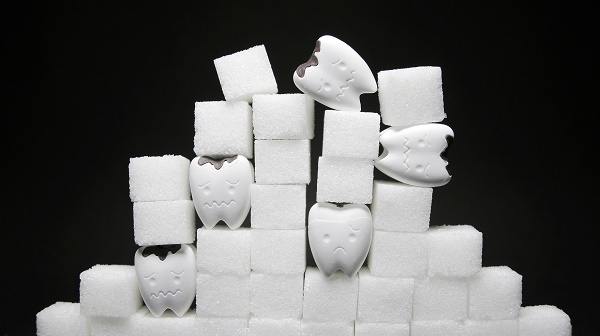
Cut Sugar and Curb Cavities
Many people wish to lead a much healthier life. They know that diet and exercise are a major part of a healthy lifestyle, but not many understand how the role of diet and exercise plays in their oral health as well. It’s no surprise that sugar is keeping you from losing a little extra weight, but it’s also undermining your efforts to keep your mouth disease and decay free.
Sugar and You
Sugar is embedded into our civilization. Once a rarity and luxury sugar was only used in the most decadent of celebrations. We use sugar when we’re happy on birthdays and Christmas Eve, we also use it when we’re sad as a pint of ice cream after a painful breakup. We look to sugar to make us raise us from our lows and punctuate our highs. It’s ability to do this lies in its chemistry. Our cells need sugar to work. Glucose provides the quick energy that our brain needs to fire synapses and make our body work. In fact our 50 percent of the glucose our bodies is used by our brains. Without glucose in our bodies we become agitated, sluggish, and forgetful. However, too much sugar can be just as harmful to our bodies. The most jarring example is that of type II Diabetes. After prolonged elevated glucose levels in the bloodstream the body begins to destroy the cells in the pancreas that produce insulin, the chemical that breaks down sugar so our bodies can transport it safely to where it needs to go. Not everyone who eats sugar develops diabetes, but we can all relate to the emotional highs and expanded thighs that come along with excessive sugar consumption. Sugar in and of itself is not inherently bad for you, however how it is or isn’t digested is where many problems lie.
How Is Sugar Digested
Sugar begins its digestion in the mouth. In the mouth it is digested twice, once by our bodies and again by bacteria that live in our mouths. The digestion of sugar in our mouths by harmful bacteria results in acid that causes tooth decay and gum disease. Our bodies begin to digest sugar in the mouth with an enzyme called salivary amylase. This enzyme does not have much time to break down very much sugar, but it gets the process started. Once food travels down the esophagus into the stomach the sugars are still largely untouched. It is not until they reach the small intestine that sugars are broken down into monosaccharides and they can be used by the body. The pancreas sends out insulin and other specific enzymes to break each type of sugar into the smallest form it can be broken down into. It is not until then that the body will be able to use the sugars you have consumed.
You need 130 milligrams of carbohydrates for your brain to function properly. This is because carbohydrates are complex sugars that are broken down in the body. To get these sugars it is best to choose fruits, vegetables, whole grains, and dairy products rather than sugary treats or highly processed foods. This way your body can do what it was designed to do instead of storing excess sugars in fat cells and leaving them on the teeth to rot.
Dental Success in Cutting Sugar
In recent years many groups of people have made the connection that excessive sugar consumption is bad for the body and the overall population. In the United States alone the cost to treat obesity-related illnesses was estimated at $147 billion dollars, and absenteeism stemming from illnesses caused by obesity were estimated to have cost American companies around six billion dollars. To address this many municipalities have placed “sugar taxes” on items that contain an excessive amount of sugar. Whether or not you agree with “vice taxes” the results of these imposed financial barriers have made quite an impact on the teeth of these populations.
In the UK a sugar levy will be placed in April of next year. Based on evidence from levies like this in other areas of the world, experts are estimating that this tax on sugar will reduce the amount of type II diabetes and cavities in young children. High costs of high-sugar drinks will encourage manufacturers to cut the amount of sugar in their drinks so they are not taxed. They estimate that even a 30% reduction in high-sugar drinks and a 15% reduction of sugar in medium-sugar drinks will prevent 296,000 cavities from developing.
If you want to make a positive change in your life, cut back on sugar. This small change can help your body and teeth operate healthfully and happily. If you have any questions about how to keep your teeth free of sugar and the harmful effects of acid erosion, contact your Melbourne, Florida dentist for advice on oral hygiene today.

